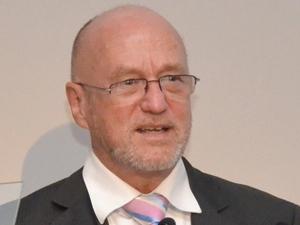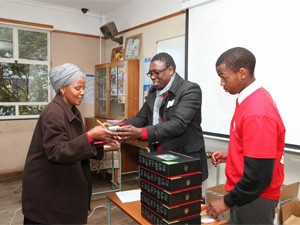
Government is turning to technology as a solution to educational problems in rural areas with the ICT4RED (ICT for rural education development) project.
Teachers at 11 rural schools received tablets at the end of last month through the ICT4RED initiative, bringing the total tablets distributed through the programme to 216.
ICT4RED is part of TECH4RED, a joint initiative by the Department of Science and Technology, Department of Basic Education, Eastern Cape Department of Education and Department of Rural Development and Land Reform, that aims to improve learning outcomes in rural areas by implementing various technology initiatives. Initiatives include piloting new and emerging technologies for water and sanitation, energy, nutrition and health.
The CSIR Meraka Institute, which is managing the ICT aspect of the initiative, last week updated science and technology minister Derek Hanekom on the progress made since the TECH4RED project commenced early last year.
The pilot was conducted at the Arthur Mfebe Senior secondary school in the Eastern Cape, in 2012. This saw tablets being distributed to all the teachers at the school, under the CSIR Meraka's "Learn to Earn" model, where each teacher had to agree to attend a number of training courses and do their homework in order to "earn" their tablets.
Storage facilities and charging stations were installed at the school, as well as a WiFi network and a content server. The school was also provided with two MobiKits, each holding 10 tablets. These tablets were given to the matric learners, who share them and take turns to take the tablets home to help with their studies.
Training was given to all the teachers at the school and, in June 2013, all the teachers fulfilled the requirements set out and the tablets officially became their personal property.
At the end of last month, tablets were given to all the teachers at the additional 11 schools that form part of the first phase of the project in the Cofimvaba Educational District, as well as a tablet to each matric learner at the Arthur Mfebe Senior secondary school. The teachers will now also undergo training according to the "Learn to Earn" model, which will be completed in March 2014.
Merryl Ford, manager of ICT for education at the CSIR Meraka Institute, says while originally 10 tablets were sponsored, the rest were all purchased according to a strict procurement process and then went through a comprehensive testing process.
More than tablets
However, there is more to the project than the simple provision of tablets, says Ford. "There is a lot happening behind the scenes. The schools are undergoing change management training to prepare them for rollout of technology; they will get WiFi in each school, content servers, secure charging stations, etc," she explains.
"They will also get shared tablets for the learners and, based on how it goes, there will be a wider rollout of tablets to their schools. There will be technical support at each school and local youngsters trained to support them. District officials are also receiving training on how to support the schools with tablet rollouts."

Another project hosted by the CSIR and forming part of the TECH4RED initiative is an online math tutoring service called Dr Math, which offers learners real-time help with their mathematics homework through the use of Mxit.
According to Ford, this service was introduced at each of the 12 schools in the ICT4RED project, but is available for free to any high school learner in SA who has access to Mxit. More than 60 000 learners have already used this service, she says.
Students from the Faculty of Engineering, the Built Environment and Information Technology at the University of Pretoria and other volunteers offer learners tutoring via the Dr Math service. The tutors receive training prior to joining the project and all conversations are recorded and evaluated to ensure the tutors are proficient to tutor on their own.
As an extension to this project, learners can also make use of QuizMax, which gives them access to practise tests and exams on the social media platform and allows them to access Siyavula Mathematics and Science textbooks on the service.
Share